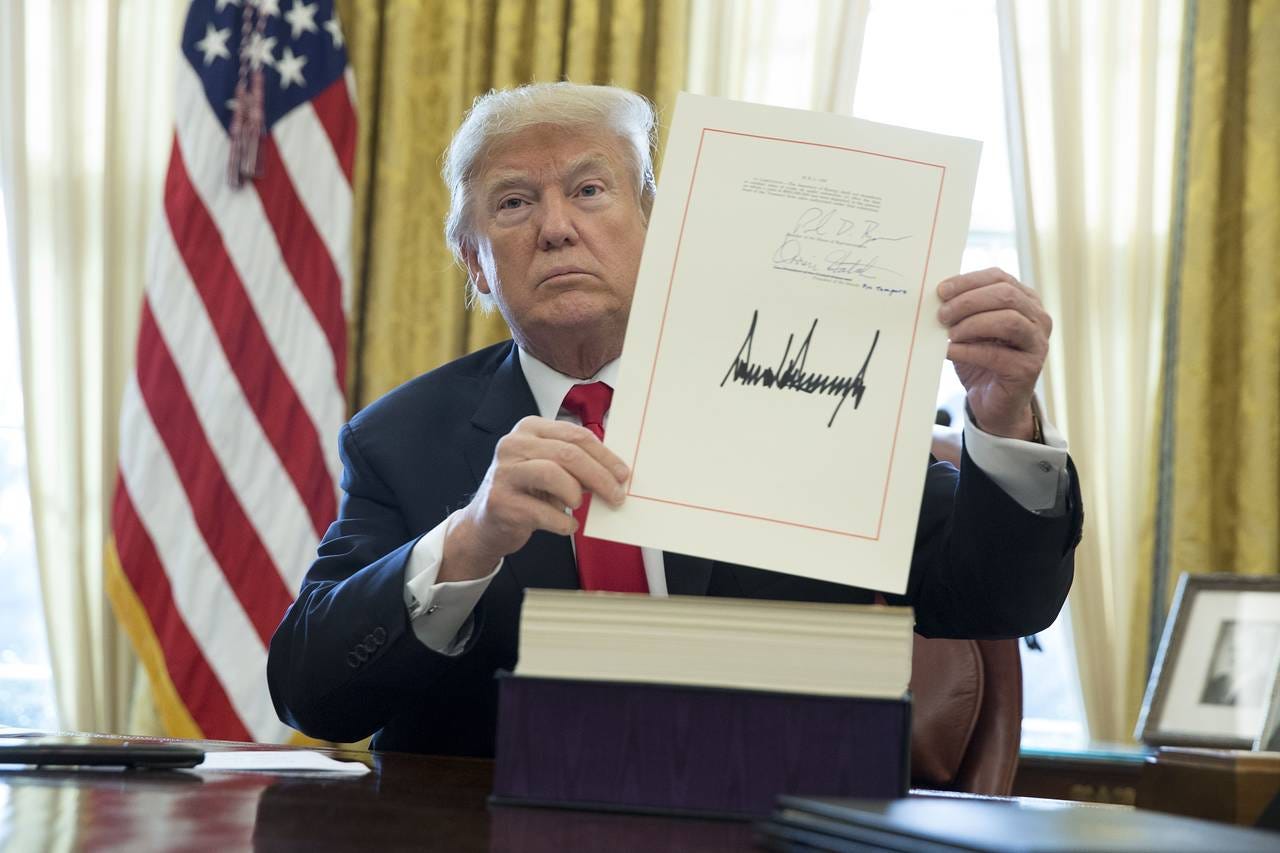Trump is already trying to circumvent Congress
He keeps saying he's "appointing" people or they "will serve." This is a sleight-of-hand and ties directly to Project 2025. The language matters, and we need to call him -- and the media -- out on it.
There is a dark con brewing, and we’re still 10 weeks away from Trump taking office.
Donald Trump is now floating his potential nominees for his cabinet — and as wretched as they are, as unqualified, as lacking in the requisite temperament for such high office — there is an even deeper problem afoot. Trump keeps saying that he is “appointing” someone, or that they “will serve as” a particular officer. And the media is aping his language.

There is a big problem here. Cabinet officials are not appointed. They are nominated — and may serve if and only if they are approved by a majority vote of the Senate. If this may seem obvious, it’s because it is: it’s in the Constitution. But the language matters, deeply. Such a verbal switch is “designed to make lies sound truthful,” as George Orwell wrote. Trump, whether deliberately or as second nature coming from someone who lies and manipulates so constantly, is performing this magic trick, and the audience is falling for it.
How do we know that there’s actually something deeper going on here, rather than people merely being sloppy with language? Because we all have access to the guidebook for this new administration — Project 2025.
One of the consistent themes throughout the various sections of Project 2025 is the wish for a more imperial presidency, one unfettered by such quaint tethers as Senate confirmation or the legally enshrined principle of a professional career civil service. Over and over, the authors of the document (most of them senior officials from the first Trump term) not only call for a drastically increased number of political appointees (i.e. not career civil servants who actually have expertise in the areas they cover, but hacks and sycophants who will be loyal to Trump), but they also give the game away by stating that they will begin seizing control of Secretary-level power in the various federal agencies even before the Senate can confirm anyone.
In their dark vision, this would allow them to begin mass firing of career civil servants and the elimination of entire offices and divisions and even whole departments, all on the whims of the president alone.
Trump has now made it very explicit that he intends to follow through on Project 2025’s plans — including, for example, saying that he will eliminate the Department of Education.
The problem then immediately arises that the media discourse becomes “is this a good idea” or “wow look at all the actions he’s taking” rather than “does he even have the power to do anything like this.” As soon as the leader speaks, the questioning regarding his power begins to quiet. His authoritative language becomes a presumption of authority and an acquiescence to it.
Yet Donald Trump most decidedly does not have the unilateral power to eliminate an entire federal department. While there are plenty of smaller units of government that are creatures of the presidency and can be plausibly undone by a president (e.g. presidential task forces), departments are created and funded by Congress, and the Department of Education is no exception.
If Trump wants to eliminate an entire department, it must pass a majority vote in both houses of Congress. If that is not noted in the first or second paragraph of every news article on the subject, that’s journalistic malpractice — and worse, it propagates the cancerous misinformation that Trump can act in such a dictatorial or monarchical manner.
While we’re at it, it would be a great and glorious thing if we could all agree to stop referring to a particular president by the number of their presidency — 44 for Obama, 46 for Biden, or 45 or now 47 for Trump. This is, again, a case of language mattering deeply. To give a person such a designation is to exalt them — and it reifies the concept of an imperial presidency that is set on a pedestal far above the rest of the government, and especially Congress, reducing the entire government down to one individual. It also represents the media’s celebrification of the presidency, as though the president were a star player with an iconic jersey number (as opposed to his more forgettable teammates). It somehow manages to glorify and degrade the office simultaneously.
If the entire government can be reduced down to the actions of one person — and if that person is treated as a celebrity — then it should come as no surprise that the White House is about to be reoccupied by a reality show star who is trying to use authoritarian language and shadow-casting to claim unilateral control over federal agencies and their leadership.
One of our many, many jobs is to recognize the language being used, the laws and norms being implicitly or explicitly bypassed as a result, and to insist on accuracy, transparency, and legality — both in media discourse and in the political and legal arenas.


TFG’s decisions to select people with minimal experience is yet another indication of what a dreadful leader he is.
I appreciate your comment about pointing out the numbers game with the presidents. It really rankles me but I could never put my finger on why.
Now I know why. It’s like King George V. Same vibes.